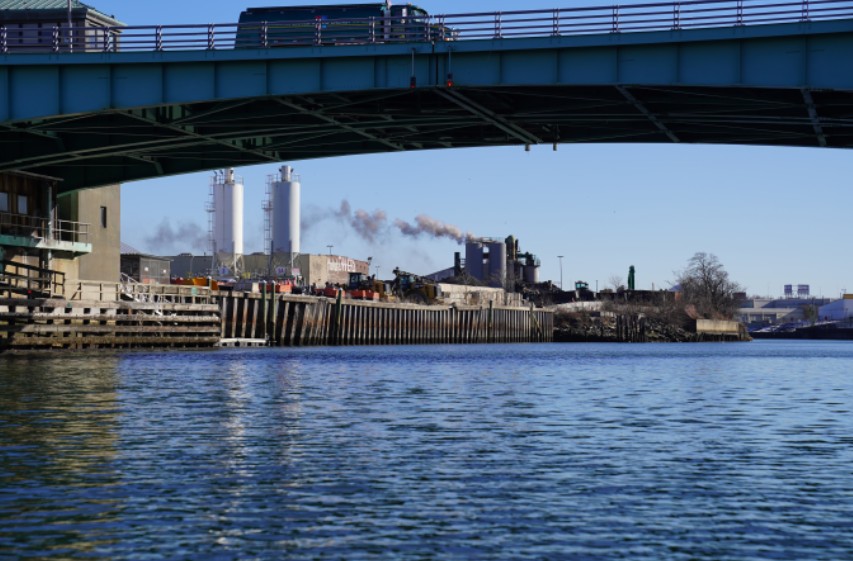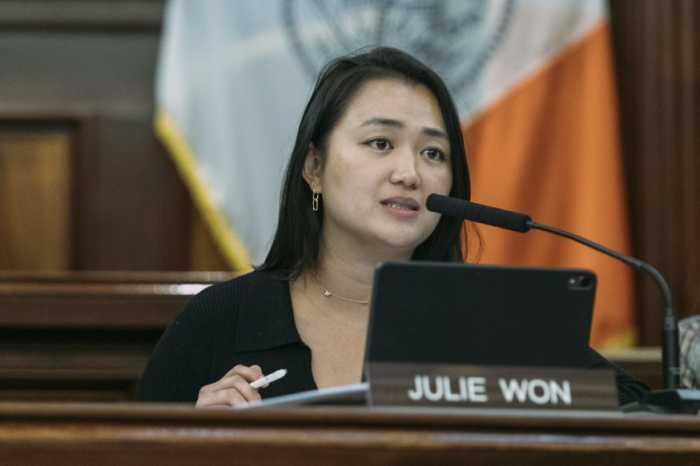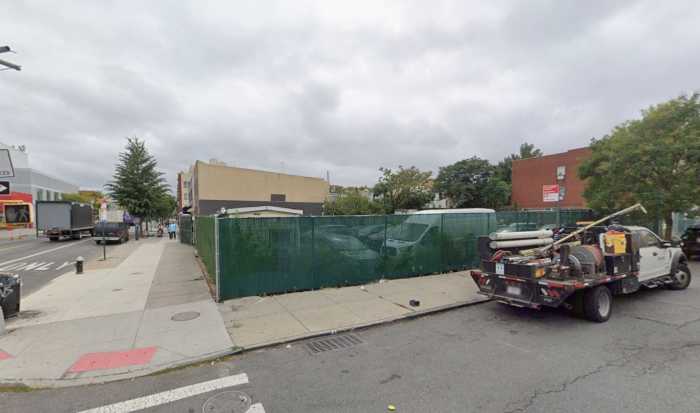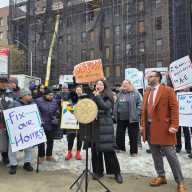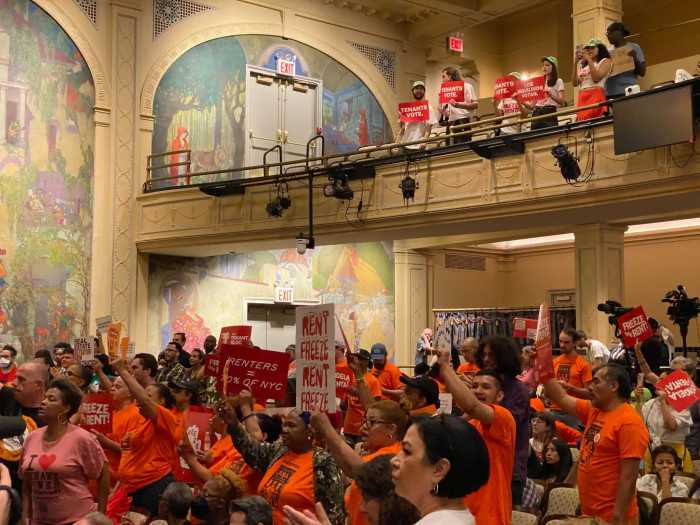Blissville residents have launched efforts to secure hundreds of specialized air purifiers for the community in response to what they describe as persistent pollution from a green asphalt plant on the Long Island City waterfront.
Green Asphalt, located at 37-98 Railroad Ave., replaces traditional asphalt mixes with recycled asphalt, stating that recycled mixes help reduce costs for contractors and improve sustainability goals in projects across the city.
However, residents have stated that fumes from the plant have created significant quality-of-life issues in the area ever since Green Asphalt established a presence in Blissville in 2011.
Residents told QNS in June that those issues have intensified over the past year-and-a-half, leaving locals struggling with acrid smells regularly.
Green Asphalt, which received a nuisance violation from the New York State Department of Environmental Conservation (DEC) over the issue in January 2024, has pledged to expand the height of the plant’s smokestacks to carry emissions further into the atmosphere and avoid creating quality-of-life issues for local residents.
Residents, however, stated the problems have persisted over the summer, including an incident on the night of Aug. 12 when Blissville was “engulfed” in emissions from the plant overnight. Some residents told QNS that it was “difficult to breathe” on the night in question.
Sources familiar with the matter stated that the incident related to a specific city contract that Green Asphalt had taken on, which required the production of asphalt overnight. Sources insisted that Green Asphalt usually strives to produce asphalt during normal daytime hours and added that incident sparked so much concern because residents are not used to seeing the plant operating at night time.
They said that contract has now come to an end and the issue has been resolved.
But residents say the broader issue of air contamination still persists and are now campaigning for two grants that would provide the neighborhood with roughly 300 air purifiers to mitigate the impact of the pollution.
The two grant applications, which have been sponsored by the Hunters Point Parks Conservancy and Urban Upbound and are now before the DEC, would enable the purchase of specialized units from Germ Solutions USA, a company that has previously installed 500 air purification units in East Palestine, Ohio after a train derailment caused dangerous toxins to spread through the air.
Germ Solutions Vice President Thomas Lawton said the purifiers work by using HEPA and carbon filers to remove dangerous pathogens from the air when air enters a building. The purifiers also clean air that is already present in a building as well as removing pathogens and toxins from surfaces inside a building, Lawton said.
“It’s not just the air,” Lawton said. “It’s also a countertop or a kitchen table being purified.”
Lawton said he reached out to the Blissville Civic Association after reading of the quality-of-life issues facing the Blissville community over the summer and said he has since visited the neighborhood personally.
“There’s no escaping it. I mean, air goes everywhere,” Lawton said. “They’re choking and it (the pollution is visible).”
Lawton said he has personally witnessed thick plumes of emissions that are so dense that they resemble a heavy fog.
“You can taste it,” Lawton said. “It’s a metallic tase. It’s not a healthy taste.”
Several months ago, Lawton installed a purifier in the home of 25-year Blissville resident Kim Dossin as a trial run. Dossin, 65, who suffers from asthma and a stage 3 liver condition, said she had trouble breathing in her own home at times due to the contamination and said her cat was even “heaving” at certain points.
She said smoke from the plant could take up to a day to clear, adding that the issue impacts communities in Blissville and Greenpoint on different days depending on the direction of the wind.
Dossin has noticed a tangible difference in her own home since installing the purifier several months ago, stating that she began to see a clear result within a few days of installing the unit.
“My oxygen level has gone up,” Dossin said. “I now sleep through the night.”
She said she has also noticed a real change in how her voice sounds, noting that she feels a difference in her throat when she wakes up in the morning after spending the night in the purified apartment compared to how she feels when she returns to the apartment after walking around the neighborhood.
“It has made a tremendous difference,” she sad. “The scent of my apartment, the freshness, the difference between standing in my apartment versus opening up my front door and standing out in the hallway is remarkable.”
Hunters Point Parks Conservancy, which is sponsoring one of the two grants before the DEC, said it is advocating for the purifiers in order to “offset some of the impacts” of the Green Asphalt plant.
HPPC Executive Director Jessica Sechrist said the plant has had a negative impact on air quality and is causing significant quality of life and health issues for the communities that surround it. She added that the purifiers will help keep vulnerable members of the community in their homes while a longer-term solution is reached.
“We’re pleased to partner with Germ Solutions USA to apply for a grant that would allow the purchase of air purifiers to help residents affected by air pollution issues from the Green Asphalt plant in Blissville,,” Sechrist said in a statement.
“Long Island City residents deserve clean, breathable air in their communities and homes, and vulnerable community members need an interim way to mitigate the pollution while a larger solution is worked towards by the DEC and our elected officials.”
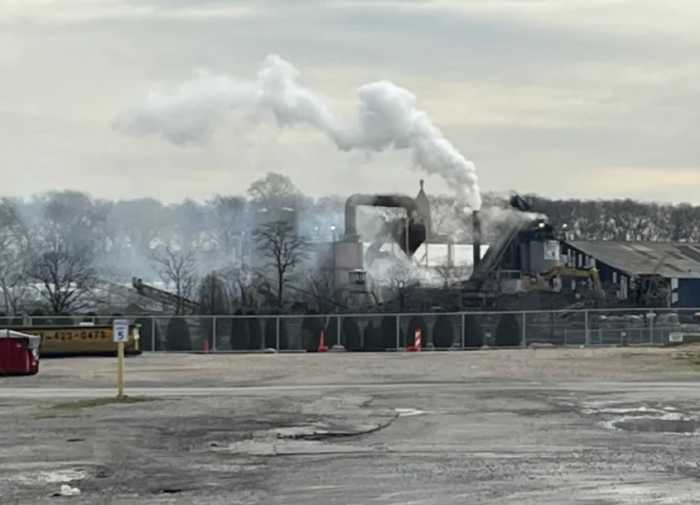
Dossin, meanwhile, believes the purifiers are only a partial solution to the ongoing issue and called on Green Asphalt to “stop polluting the air.”
“All we can control is what’s inside our own environments,” she said. “They have to stop polluting the air. We can smell it. We can taste it… it’s choking us, both physically and mentally.”
Dossin also alleged that pollution from the plant has “gotten worse” in the months since Green Asphalt pledged to adopt mitigation efforts.
A spokesperson for Green Asphalt said the plant is on track to meet all deadlines provided by the DEC, with tank vents and fugitive dust shrouds set to be installed at the plant this week to help mitigate the plant’s impact.
The company said it is also on course to heighten its existing smokestacks by the DEC’s Dec. 11 deadline pending approval from the Department of Buildings.
A DEC official said the agency is actively working with Green Asphalt to require improvements such as raising the stack height to improve dispersion of emissions from the plant.
The official also stated that the agency prioritizes the safety of the local community.
“If further controls are required to ensure public health and the environment are protected, DEC will require the facility to take appropriate action,” the official said.
A spokesperson for Queens Borough President Donovan Richards said Richards is “acutely aware” of the concerns of local residents in relation to the Green Asphalt plant.
Richards’ spokesperson noted that the Borough President called for the existing smokestack to be doubled in height in his conditional approval of the OneLIC Neighborhood Plan.
“As an ardent environmental justice and clean energy advocate, the Borough President is also committed to working with all our government and community partners in devising long-term strategies to monitor and improve air quality in not just Blissville, but all Queens neighborhoods,” a spokesperson for the Borough President said in a statement.
Council Member Julie Won, who represents Blissville in the City Council and has previously co-signed a letter calling on the DEC to temporarily suspend operations at Green Asphalt until the issue has been addressed, said she “remains concerned” by toxic fumes and low air quality impacting the neighborhood.
“My office is in contact with Green Asphalt, who is actively working to be in compliance with state regulations,” Won said in a statement. “As this work continues, I have asked Green Asphalt to monitor and share air testing data and communicate directly with community stakeholders. I will continue to work with my colleagues in the state legislature and Blissville residents to advocate for a swift resolution to this issue.”

